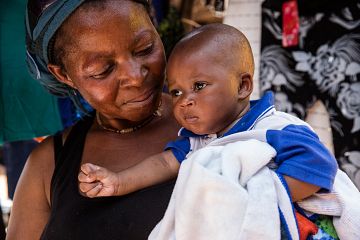WHO recommends RTS,S/AS01 malaria vaccine for children in sub-Saharan Africa
6 October 2021 Mother and baby, Malaria Consortium Campaign in Ziniare, Burkina Faso. Sophie Garcia/ Malaria Consortium
Mother and baby, Malaria Consortium Campaign in Ziniare, Burkina Faso. Sophie Garcia/ Malaria ConsortiumToday, the World Health Organisation (WHO) announced that there is evidence to recommend that the RTS,S/AS01 malaria vaccine should be provided to reduce malaria disease and burden in children living in sub-Saharan Africa. This recommendation followed a WHO-coordinated large pilot implementation project in Ghana, Kenya, and Malawi, where 2.3 million doses have been administered since 2019, with over 800,000 children receiving at least one vaccine dose.
The recommendation, approved by the global advisory bodies for immunisation and malaria – the WHO Strategic Advisory Group of Experts on Immunization (SAGE) and the WHO Malaria Policy Advisory Group (MPAG), was dependent on full evidence review for feasibility, safety and impact. The RTS,S/AS01 vaccine had previously been evaluated in a large Phase 3 trial that showed that the RTS,S/AS01 vaccine was efficacious and received a positive regulatory assessment from European Medicines Agency. However, a number of safety uncertainties needed to be resolved in order to assess the advisability of introducing the RTS,S/AS01 vaccine for routine use.
The questions that were addressed in the pilot implementation study included an assessment around the following:
- The operational feasibility of providing the malaria vaccine in the target age-group at the recommended 4-dose schedule in the context of health service delivery
- An evaluation of the impact of the vaccine on reduction in all-cause mortality and hospital admissions with severe malaria, by sex
- The safety signals for meningitis and cerebral malaria and gender comparisons on all-cause mortality
- Evidence on the comprehensive evaluation of vaccine coverage, adherence to recommended malaria control measures, community engagement and health system functioning
The findings from this malaria vaccine pilot implementation project showed the following;
- Safety: issues that were observed in the Phase 3 clinical trial (2009-2014) were not seen in the pilot implementation
- Impact: the findings demonstrated effectiveness of the RTS,S/AS01 vaccine against severe malaria with a 30% reduction in hospitalisation due to severe malaria and a 21% reduction in hospitalisation with malaria parasitaemia
- Feasibility: Evidence from the pilot showed that the vaccine is feasible to administer, that uptake was high across the three countries the trial was conducted in, and that the vaccine did not negatively impact other vaccinations that eligible children needed
In addition, the malaria vaccine did not negatively impact on the use of other malaria control interventions like Insecticide-treated bed nets. The evidence also shows that the malaria vaccine could reach children who may have lower access and lower use of other malaria prevention measures. Adding a malaria vaccine to current interventions could therefore increase access and reduce intervention coverage gaps.
“The recommendation is a milestone because it recommends the routine use of a malaria vaccine for the first time in history. The vaccine should be seen as a new and complementary tool in accelerating and sustaining progress along the continuum to malaria elimination. In particular, it adds to the combination of interventions that are essential to preventing children from the devastating effects of malaria infection and malaria disease. We believe that the vaccine will be most effective when used in combination with the existing mix of proven malaria interventions, including seasonal malaria chemoprevention (SMC), long lasting insecticide nets, parasite-based diagnosis and case management,” said Dr James Tibenderana, Malaria Consortium’s Technical Director.
Further research into the uses for the RTS,S/AS01 vaccine is ongoing, demonstrated by the recently published New England Journal of Medicine paper on seasonal vaccination and SMC. This provided evidence for the consideration for alternative seasonal options of providing the RTS,S/AS01 vaccine in settings with highly seasonal malaria transmission, in addition to the routine vaccination recommended in settings with perennial malaria transmission.
Latest news
- Malaria Consortium honoured by Ugandan government for contribution to combat malaria23rd April 2024
- International summit calls for AMR accountability in public health interventions21st March 2024
- Global SMC community celebrates new milestone at SMC Alliance Annual Meeting in Nigeria6th March 2024
- Scaling up key interventions could halve pneumonia-related childhood mortality13th February 2024
- Malaria Consortium and eGov Foundation join Mozambique’s national malaria programme to digitalise seasonal malaria chemoprevention campaigns8th February 2024
- World’s first malaria vaccine rollout launched in Cameroon22nd January 2024